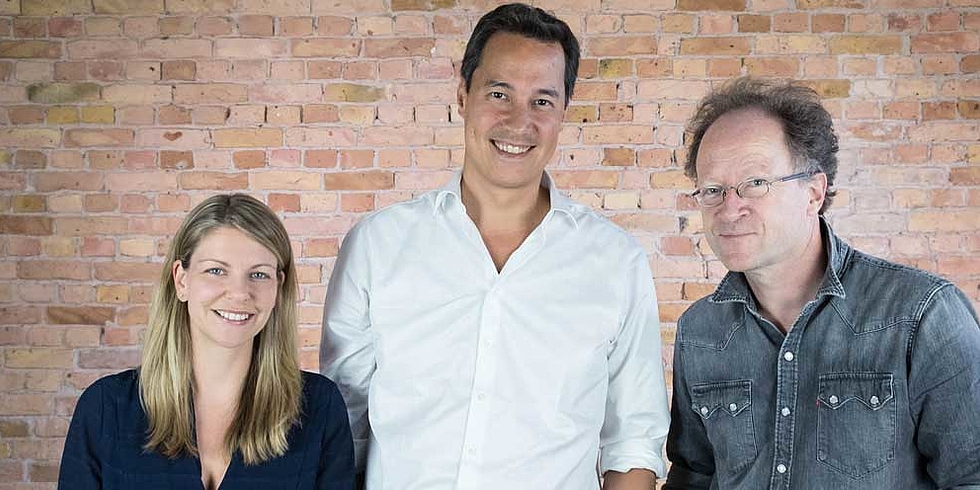Dr. Martin Hirsch from Ada
Numerous innovations are developed in Berlin, by linking technologies from the digital and creative sector with the challenges faced in other industries (so-called cross-cluster innovations). The Berlin startup business Ada Health provides an example of how digital solutions, and in particular artificial intelligence, can be used to the benefit of the healthcare system.
The startup business Ada Health has developed an app that combines AI-powered technology with human knowledge to help people better assess their state of health. Ada App is available worldwide for iOS and Android. The company was founded by Daniel Nathrath, Dr. Claire Novorol and Dr. Martin Hirsch and has offices in Berlin, Munich and London. Use of the app is free of charge.
Ada Health is an AI-powered personal health guide – will it be able to replace a visit to the doctor in the future?
The aim of Ada is to help people understand their health and to navigate them to the right treatment at the right time. On the basis of trusted and high-quality personalised health information, patients are empowered to take informed decisions about their health. This can help avoid unnecessary visits to the doctor, which is a tremendous cost centre within the healthcare system. At the same time, warning signs can be detected in the initial phase of a disease. Therefore, Ada is not intended to replace a visit to the doctor, but rather make doctor’s consultations more efficient, also for the doctors.
How exactly does Ada work?
Ada is supported by a knowledge-based AI-powered technology, developed by our experts over a period of seven years. Unlike the human brain, Ada is able to easily consider more than one thousand individual symptoms, even if Ada has never seen them in any patient before. An analysis of symptoms starts with Ada getting to know the patient by means of a short dialogue of medical history, in the same way as a doctor would do. After that follows a focused inquiry about the symptoms that occur and their specific manifestation. In the background, Ada’s AI-powered technology matches the user’s situation with over one thousand probalistic models of diseases. One of our special concerns has always been to show the patient or doctor in a transparent way how Ada has come to its conclusion.
Are the diagnostics given truly reliable…?
The knowledge increase in the medical field is as rapid today as never before. This is the clear advantage of artificial intelligence. A machine is able to access significantly more knowledge than the human brain – and never gets tired. In cooperation with physicians and leading medical experts, we have established a giant medical knowledge network based on Ada’s artificial intelligence, which complies with the latest scientific standards. Ada has been programmed by using thousands of real-life cases. To ensure the best quality of symptom analysis, we take improvement measures on an ongoing basis.
Your business started in 2016 – how many people are already using your app?
Since the patient app was launched in late 2016, Ada has delivered more than six million pre-diagnostics to over four million users worldwide. The app can be downloaded free of charge from anywhere around the world from Google Play Store and Apple Store. In 2017, Ada was the number one of medical apps in over 130 countries.
How many employees are globally linked within your company?
We are more than 120 employees from over 35 countries with expertise in the fields of medical science, health, science, technology and industry. Our headquarters are located in Berlin, and in addition, we have offices in Munich and London.
How long have you worked on Ada?
We started developing our own AI and establishing Ada’s medical knowledge base in 2011, so more than seven years ago.
Your aim is also to help people in developing countries who are unable to consult a doctor …
More than four billion people around the world do not have access to health information or basic medical services. This is where AI technology like Ada comes in, by giving these people access to personalised, relevant information and defining the correct treatment steps to take next. To achieve this, we work with local authorities and healthcare providers on site. At present, we are particularly committed to supporting people in Tanzania, which is why we are working on a version of Ada in Swahili.
Why did you move to Berlin with your startup?
In 2011, we took our first steps in Berlin in the heart of Kreuzberg, where our headquarters are to this day in Adalbertstraße. The startup ecosystem in Berlin offers excellent conditions for establishing businesses and it can easily match its tech competitors London, San Francisco and New York, in particular as the cost structure is significantly lower, compared to the other cities. Skilled workers from around the world flock into the city with its inspiring environment of people with multicultural background and an open, global mindset. Thus, they encounter ideal conditions for establishing global services. In addition, the city provides best possible networks with excellent and internationally renowned research institutions such as Charité.
Where do you see your startup in five years from now?
The healthcare sector offers Ada still plenty of space for growth and further development. Our aim is to provide people all over the world with a personal health guide, by offering individual advice and support at any time, facilitating the dialogue with doctors, reducing the time pressure for doctors and helping patients to navigate through the healthcare system.
Last but not least: Can you complete the following sentence: “Berlin is…”
... with its classical and technological energy, it is just the right location for us to pursue our goals and allow every human access to personalised healthcare.


